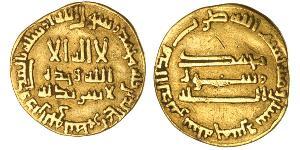| Muhammad ibn Abdallah al-Mahdi محمد بن عبدالله المهدى |
|||||
|---|---|---|---|---|---|
| 3rd Caliph of the Abbasid Caliphate | |||||
| Reign | 775–785 | ||||
| Predecessor | al-Mansur | ||||
| Successor | al-Hadi | ||||
| Spouse | al-Khayzuran | ||||
| Issue | Banuqa Al-Hadi Harun Al-Rashid Abassa |
||||
|
|||||
| Dynasty | Abbasid | ||||
| Father | al-Mansur | ||||
| Born | 744 or 745 | ||||
| Died | 4 August 785 | ||||
| Religion | Islam | ||||
Abu Abdallah Muhammad ibn Abdallah al-Mansur (Arabic: أبو عبد الله محمد بن عبد الله المنصور; 744 or 745 – 785), better known by his regnal name al-Mahdi bi-'llah (المهدي بالله, "He who is guided by God"), was the third Abbasid Caliph who reigned from 775 to his death in 785.[1] He succeeded his father, al-Mansur.
Reign[edit]
Al-Mahdi, whose name means "Rightly-guided" or "Redeemer", was proclaimed caliph when his father was on his deathbed. His peaceful reign continued the policies of his predecessors.
Rapprochement with the Alids in the Caliphate occurred under al-Mahdi's reign. The powerful Barmakid family, which had advised the Caliphs since the days of al-'Abbas as viziers, gained even greater powers under al-Mahdi's rule, and worked closely with the caliph to ensure the prosperity of the Abbasid state.
Al-Mahdi reigned for ten years. He imprisoned his most trusted vizier Ya'qub ibn Dawud. In the year 167 AH/ 783 AD, al-Mahdi instituted an official inquisition which led to the execution of alleged Zindiq (heretics). He was fond of music and poetry and during his caliphate many musicians and poets received his patronage and he supported musical expression and poetry across his dominion.
In 777 AD (160 AH) he put down the insurrection of Yusuf ibn Ibrahim in Khurasan. In the same year al-Mahdi deposed Isa ibn Musa as his successor and appointed his own son Musa al-Hadi in his place and took allegiance (bayah) for him from the nobles. In 778 AD (161 AH), he subdued the rebellion of Abdallah ibn Marwan ibn Muhammad, who was leading the Umayyad remnant in Syria.
Al-Mahdi was poisoned by one of his concubines in 785 AD (169 AH).
Cultural and Administrative Aspects of his Reign[edit]
The cosmopolitan city of Baghdad blossomed during al-Mahdi's reign. The city attracted immigrants from Arabia, Iraq, Syria, Persia, and lands as far away as Afghanistan and Spain. Baghdad was home to Christians, Jews, Hindus and Zoroastrians, in addition to the growing Muslim population. It became the world's largest city.
Al-Mahdi continued to expand the Abbasid administration, creating new diwans, or departments: for the army, the chancery, and taxation. Qadis or judges were appointed, and laws against non-Arabs were dropped.
The Barmakid family staffed these new departments. The Barmakids, who were of Persian extraction, had originally been Buddhists. Their short-lived Islamic legacy would count against them during the reign of Harun al-Rashid.
The introduction of paper from China (see Battle of Talas) in 751 had a profound effect. Paper had not yet been used in the West with the Arabs and Persians using papyrus and the Europeans using vellum. The paper related industry boomed in Baghdad where an entire street in the city center became devoted to sale of paper and books. The cheapness and durability of paper was vital element in the efficient growth of the expanding Abbasid bureaucracy.
Al-Mahdi had two important religious policies: the persecution of the zanadiqa, or dualists, and the declaration of orthodoxy. Al-Mahdi focused on the persecution of the zanadiqa in order to improve his standing among the purist Shi'i, who wanted a harder line on heresies, and found the spread of syncretic Muslim-polytheist sects to be particularly virulent. Al-Mahdi declared that the caliph had the ability, and indeed the responsibility, to define the orthodox theology of Muslims to protect the umma against heresy. Al-Mahdi made great use of this broad, new power, and it would become important during the 'mihna' crisis of al-Ma'mun's reign.
References[edit]
| Wikisource has original works written by or about: Al-Mahdi |
- ^ Stanley Lane-Poole, The Coins of the Eastern Khaleefahs in the British Museum
Bibliography[edit]
- al-Masudi The Meadows of Gold, The Abbasids, transl. Paul Lunde and Caroline Stone, Kegan Paul, London and New York, 1989
|
Al-Mahdi
Born: ? Died: 785 |
||
| Sunni Islam titles | ||
|---|---|---|
| Preceded by Al-Mansur |
Caliph of Islam 775–785 |
Succeeded by Al-Hadi |
|








